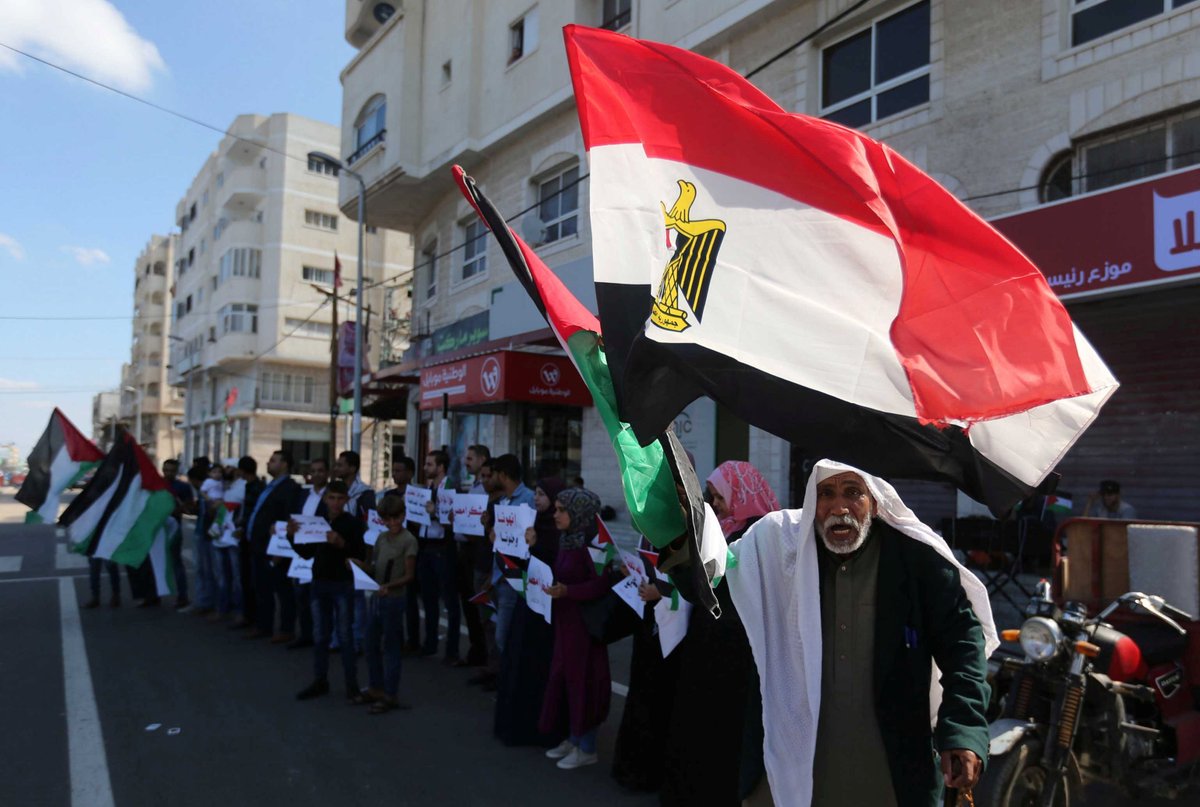Celebrations erupted in the Gaza Strip with the announcement of the Fatah-Hamas agreement in Cairo, with residents of the crowded and war-battered coastal enclave hoping desperately that the accord will bring relief from economic despair and international isolation.
But despite the fanfare and upbeat statements from both sides, a leading Gaza analyst, Mkhaimar Abusada, cautioned that in fact, they had made only “a very small step on the road to reconciliation. Both Hamas and Fatah have a long way to go before they can say the division is behind us.”
Reports from Cairo said the two sides had agreed that Hamas would hand over responsibility for the Rafah border crossing with Egypt to the Palestinian Authority by November 1. This raises hopes that the crossing, kept mostly closed by Egypt in recent years, will become a reliable channel between Gaza and the outside world.

A girl is carried as Palestinians celebrate in Gaza City on October 12, 2017, after Hamas said it reached a deal with Palestinian rival Fatah.
The two sides also agreed Hamas would hand over administrative control of Gaza to a unity government by December 1, according to a statement by Egypt’s state information service. One of the negotiators said the deal includes 3,000 members of Palestinian Authority security forces redeploying to Gaza.
But the deal did not cover major outstanding issues including the integration of Hamas into the PLO, a date for presidential and parliamentary elections and the future of Hamas’s armed wing, the Izzedin al-Qassam brigades, Mr Abusada, a political scientist at Al Azhar University, pointed out. Palestinian president Mahmoud Abbas has said the brigades must be disarmed while Hamas leaders have ruled this out.
Nor was there an announcement that Mr. Abbas would lift the crippling sanctions he imposed on Gaza six months ago, including halting payments for electricity, which caused blackouts, and slashing the salaries of government employees. The sanctions were intended to press Hamas into dismantling an administrative committee tasked with ruling the Strip. Hamas’s annulment of the committee last month paved the way for the reconciliation moves and the expectation was that Mr Abbas would lift the sanctions last week when the PA cabinet held its first meeting in Gaza in three years.
Despite the agreement’s limitations, long suffering Gazans greeted the very news that a deal had been reached with celebratory gunfire and the waving of Egyptian, Palestinian, Fatah and Hamas flags.
“This is a great step towards stability and prosperity in the Gaza Strip,” said Mohammed Faris, owner of a beauty parlour. “Gaza has been closed for ten years, with no government spending, no money, the borders closed, companies going bankrupt and soaring unemployment. The recent steps of Abbas when he cut the salaries and reduced the electricity make it much more difficult. It should be lifted now. It’s his job to look after Gaza now and take care of what the people need.”
Mr Faris said he has not been able to visit his grandchildren in Germany because the Rafah crossing has been closed. He hopes that will now change.
Raed Atamneh, a driver who lives in Beit Hanoun in the northern part of the Strip, said the agreement is “very good for Palestinians.”
“After ten dark years, after no work, no electricity and being blockaded it’s a nice agreement to open us to the world and give us a better life. Inshallah (God willing) with this government the economy will improve. The border with Egypt should now open.
“This will improve things for my family,” he added. “My kids finished university without work. Maybe now they will have a good future and find work with the new government. As for me, I have no work and eight kids to support. I hope now maybe there will be some work for me.”
Naji Shurrab, also a political scientist at al-Azhar University, termed the agreement “a very important achievement”. He said he expected some 50,000 Hamas government employees to be able to keep their jobs under unity arrangements, in a boost for the Islamic movement while the Palestinian Authority taking over the border crossings boosts Mr Abbas.
Mr Shurrab expects representatives of an array of Palestinian factions will soon travel to Cairo to pave the way for forming a new unity government. He also believes President Abbas will soon cancel the sanctions and pay a brief visit to Gaza. It would be his first in a decade.
The most difficult outstanding issue is the future of the Qassam brigades, Mr Shurrab said. But it could be resolved if Mr Abbas allows the Hamas armed wing to keep its weapons for now on condition that Hamas respect his policy decisions.
Ghassan Khatib, a former PA minister and now vice president of Bir Zeit University in the West Bank, is less than optimistic about what the agreement announced on Thursday can achieve.
“It didn’t say anything about the political, security or election files. The two sides could afford to agree only on civilian responsibility of the government. ” He also has doubts about whether President Abbas and the Palestinian Authority can govern Gaza.
“Managing the situation there is mission impossible,” he said. “Public anger will be transferred from Hamas to the PA government. They don’t have enough money, the problems are enormous and I doubt the [international] donors will be generous enough to make it succeed.”








































admin in: How the Muslim Brotherhood betrayed Saudi Arabia?
Great article with insight ...
https://www.viagrapascherfr.com/achat-sildenafil-pfizer-tarif/ in: Cross-region cooperation between anti-terrorism agencies needed
Hello there, just became aware of your blog through Google, and found ...